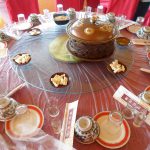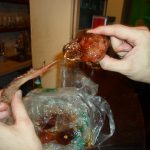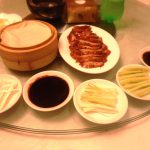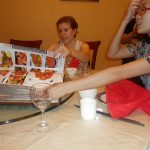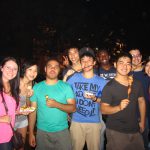“You never know until you try” is a phrase I live by daily. I was not always a brave and adventurous person but within the past few years I quickly realized if I never tried new things I would miss out on learning opportunities and once in a life time experiences. Before I left for my study abroad I promised myself I would do two things in China: soak up as much of the language and culture and say yes to everything, even if I second guessed it. If I could give any study abroad student advice this would be it, because the past month has changed me in more ways than I thought possible and opened my mind to new perspectives. One particular change in perspective has been food because it heavily influences Chinese culture. But one of the beautiful things about food is that every country, city, province, or town treasures each and every unique dish it produces. No matter where you go in the world you can always try something new.
Coming to China I had no idea what to expect, especially since I was accustomed to typical American food such as macaroni and cheese, steak, mashed potatoes, and meat without the animal’s head still attached. But I stuck to my promise and tried everything possible. Since living in Beijing I have tasted traditional Peking duck (Kǎoyā, 烤鸭), Kung Pao Chicken, hot pot, and the popular local food called chuar. Chuar is basically meat on a stick which many would consider just like a kebob. The more “shocking” pieces of foods I have tried were at Beijing’s Night Market in Wangfujing. Wangfujing is a tourist attraction featuring fruit, bubble tea (tea with dry ice), shark fin, sea urchin, sheep kidney, large scorpions, crickets, lizard, silkworm, and more. And yes, I tried it all. Like many things in life, I was glad I stepped out of my comfort zone and went for it. I was even able to convince others into trying the food with me and although they found the food to be a bit disgusting at first they loved the experience. I feel this is the best way to ease into a new culture. Students like myself, may find something to be culturally wrong or different but once you give it a chance it turns into a great story.
For example, in China the restaurants are completely different than in America. The Chinese dinner customs consist of everyone ordering a variety of dishes and splitting the bill evenly. This technique allows everyone at the table to try different dishes, plus it’s cheaper per person. We like to call this “family style.” Also, in America we politely ask the waitress for a side of ranch or more water but in China you have to scream across the room. Can you imagine a room full of people screaming, “fuwuyuan (waitress, in Mandarin)?” Another difference is that the food is not brought to the table at the same time, instead it is brought out when the food is finished cooking. And the people in China do not tip, which I know for me and most Americans may seem rude but in China it is a part of daily life and dining etiquette. When I first arrived I was not receptive to this type of environment but after living in this new city for over month I have started to adapt and even like the Chinese dining habits.
Not only have I tried the local food in Beijing, but I’ve traveled to a handful of provinces within China and each province specializes in something different. For instance in Tibet, the pilgrims (the official name for the local people) value the yak since it provides milk, butter, cheese, meat, shelter, and clothing. The yak is the main source of survival for the people of Tibet and they honor the animal by burning its butter in the religious monasteries. At first I was skeptical about trying Tibet’s Yak Sizzler dish, but it was surprisingly delicious. Another unique experience was witnessing a goat slaughtering in the grasslands of Inner Mongolia. Herding and farming is casual routine in this Autonomous Region so slaughtering a live goat left little affect on the herders, but for the Americans in my group we were not keen on watching live meat turn into dinner. And then there is the famous Chengdu, known for its spicy food. Here they eat rabbit head, duck tongue, and pour on the spices. Traveling to different places within my host country has provided me with a deeper understanding for the Chinese culture and the world I live in. I highly encourage others to take the time to not only explore your host city but surrounding cities as well, because you never know what surprises wait around the corner.
Study abroad is full of unexpected adventures and you have to learn to embrace every moment. It still hasn’t hit me yet that I’ve tried food that others deem as unacceptable or inedible, but my journey in China has consisted of trying every piece of food placed in front of me at the dinner table to getting lost in the streets of Beijing and I wouldn’t have it any other way.


